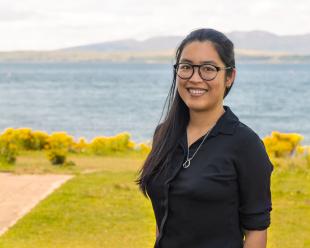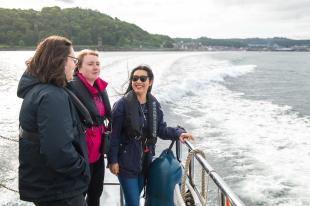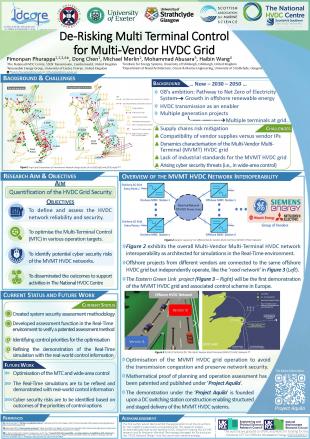Quote: Dong Chen, Senior HVDC Simulation Engineer, SSEN Transmission
‘Availability of resources is one of the key challenges we face as we seek to deliver net zero. In particular, the UK is short of power systems expertise, especially engineers with knowledge of renewables.
Undergraduate programmes are not currently addressing this need. IDCORE, on the other hand, is delivering a very effective response. Not only is our engagement with them delivering short-term benefits for our research programme, it is also helping us to build both capability and capacity.
I have been really impressed by Peach and the impact she has had so early in her project. PhD level supervision takes time, but in this case it's adding significant additional value to my work.’
IDCORE
Peach was attracted to IDCORE by the in-depth knowledge the course provides, creating a broad understanding of the renewables sector, not just specific technologies, and preparing successful candidates for a wider range of roles. The intensity of the course forces the cohort to work together and rely on each other’s strengths, building a set of relationships that are invaluable during the research phase of the programme. The cohort can become an important support network not only technically but also emotionally. Comparing experiences can be a great confidence boost and it also provides for continuous mutual learning, as the range of projects the researchers undertake is so diverse.
Background
Peach came to IDCORE from working as a graduate with Hydrowing as part of a Knowledge Transfer Partnership (KTP). The move was suggested to her by Lars Johanning (former IDCORE co-director) as a natural progression after graduating from an Integrated Masters in Renewable Energy at the University of Exeter and building on the experience she had gained through the KTP role.
Peach had originally come to the UK on a scholarship scheme funded by the Thai Government before going on to study at the University of Exeter’s Penryn campus as a personal response to the challenge of climate change. She was older than many of her contemporaries, so had not wanted to pursue the more academically-based training offered by a standard PhD, preferring instead the opportunity IDCORE provides to work in industry whilst pursuing a research degree.
Quote: Peach Phurappa
‘My experience in the KTP confirmed my view of the potential for working in offshore renewables as a way to pursue my interests in heavy electrical equipment and in particular control system design. Although my project is more about integration of renewables into the wider electricity system, it is giving me the opportunity to apply much of the knowledge I gained during my first year with IDCORE, along with the industrial skills I developed while I was with the KTP.’
Project
High voltage direct current (HVDC) transmission is becoming an enabling technology to achieve the UK target of net-zero by utilising the massive potential for offshore wind power. They enable transmission over longer distances which is useful both in the context of offshore renewables energy developments, facilitating installations that are further from the shore, but also in the context of the grid re-enforcement that is needed to support increasing renewable generation and the greater use of decarbonised electricity within the energy system.
Peach’s project is focussing on the de-risking of ‘multi-terminal control’ an important pre-cursor to the successful operation of a multi-vendor grid that can connect multiple sites with a single HVDC system. The majority of her time is currently spent running real-time and off-line simulations of HVDC systems, using digital simulators to model and plan future systems.
Peach is doing this work at The National HVDC Centre in Cumbernauld, an Ofgem-funded collaboration between Scottish & Southern Electricity Networks Transmission (SSEN Transmission), Scottish Power Energy Networks (SPEN) and National Energy System Operator (NESO). Her work is being supervised by the team within the Centre who did an excellent job of bringing her into the project and making her feel part of the operation. Although she has the option of hybrid working, she prefers to spend her days in the office even when she’s not running simulations that require her to be there. She has found being part of a team to be a very beneficial part of the experience, aided by the accessibility of her industrial supervisor and her technical manager who are both experts in their fields.









